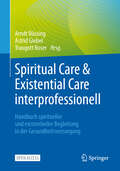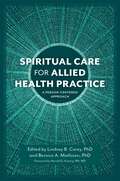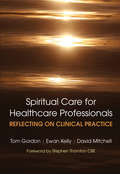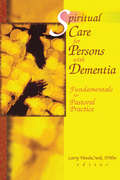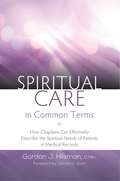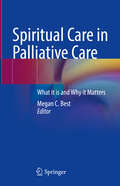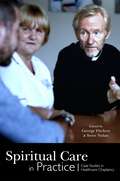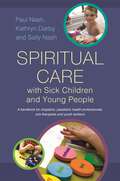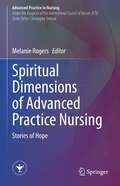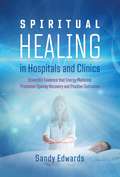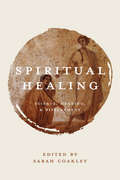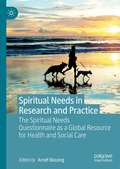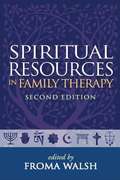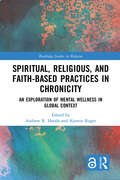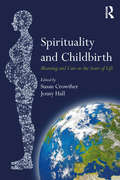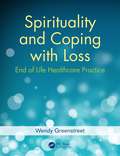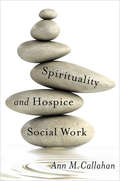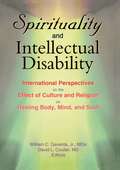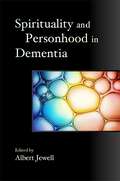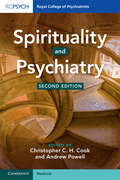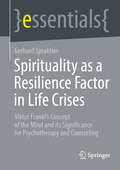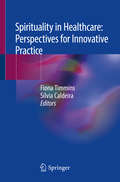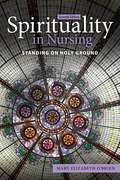- Table View
- List View
Spiritual Care & Existential Care interprofessionell: Handbuch spiritueller und existentieller Begleitung in der Gesundheitsversorgung
by Arndt Büssing Astrid Giebel Traugott RoserDie Beiträge in diesem Buch bieten einen breitgefächerten Überblick und thematischeTiefenschärfung zu ethischen, rechtlichen und strukturellen Rahmenbedingungen von Spiritual / Existential Care: Vorgestellt werden trägerübergreifende oder trägerspezifische Überlegungen zur Personal- und Organisationsentwicklung, sowie neu entwickelte Implementierungsstrategien von Spiritual / Existential Care im Gesundheitswesen. Neben empirischer Forschung und Bildungskonzeptionen werden interprofessionell erarbeitete Handlungsempfehlungen als Teil eines allgemeinen Behandlungsstandards in Medizin und Pflege dargelegt, um Mitarbeitende im Umgang mit existenziellen Fragen Schwerkranker und sterbender Menschen zu schulen.Mitwirkende aus der Deutschen Gesellschaft für Palliativmedizin (DGP), dem Deutschen Hospiz- und Palliativverband (DHPV), der Diakonie Deutschland und dem Diözesan-Caritasverband für das Erzbistum Köln haben verbandsübergreifend zur Federgegriffen, um multiperspektivisch Blickwinkel des weltanschauungs- und religionsübergreifenden Themenfelds Spiritual / Existential Care auszuleuchten. Die Autorinnen und Autoren eint dabei das Anliegen, Patienten, Bewohnerinnen, Schwerkranke und sterbende Menschen mit ihren An- und Zugehörigen nicht alleine und unbegleitet zu lassen in ihren existenziellen Fragen und spirituellem Schmerz.Das Buch Existential / Spiritual Care interprofessionell (SpECi) richtet sich an Mitarbeitende im Gesundheitswesen im Haupt- und Ehrenamt, an Träger von Einrichtungen der gesundheitlichen Versorgung, Kostenträger und Gesundheitspolitik mit dem Anliegen der Verbesserung der spirituellen Begleitung Schwerkranker und sterbender Menschen sowie deren An- und Zugehörigen. Dies ist ein Open-Access-Buch.
Spiritual Care for Allied Health Practice: A Person-centered Approach
by Harold Koenig Lindsay B. Carey Bernice A. MathisenProviding spiritual care is an important part in administering person-centred holistic care. This textbook explains why it is so important for any allied health professional (AHP) to be involved in, or assist with, the provision of spiritual care for patients and how to do so. Each chapter addresses a specific field of allied health practice, such as speech-language therapy, physiotherapy, occupational therapy and other allied heath areas. The contributors explain how spiritual care can be applied in their specialist area, making it relevant for all AHPs. With contributions from leading academics and practitioners in allied health practice, this book will help AHPs understand how to give patients the complete care that they need, making this text essential reading for AHP practitioners, clinical supervisors, researchers, academics, tertiary lecturers and allied health students.
Spiritual Care for Healthcare Professionals: Reflecting on Clinical Practice
by David Mitchell Tom Gordon Ewan KellyIn the past 10 years spirituality and spiritual care have been much debated in professional healthcare literature, highlighting the need for a recognised definition of spiritual care to enable appropriate assessment of, and response to, spiritual issues. This accessible and highly relevant book surveys the numerous statements, guidelines and standards highlighted by these discussions, and equips healthcare professionals with the knowledge, skills and competence to provide the essence of spiritual care within their professional practice. Practical and evidence-based, this manual proves that delivery of good, professional spiritual care can build on intuitive human skills, and can be taught, learned, assessed and quantified. It gives readers the opportunity to move on from uncertainties about their role in the delivery of spiritual care by allowing them to asses and improve their understanding, skills and clinical practice in this area of care. Spiritual Care for Healthcare Professionals clearly grounds spiritual care in clinical practice. It is highly recommended for supporting academic study and encouraging healthcare practitioners to reflect on their practice and develop skills in spiritual assessment and care. Aimed at all healthcare professionals, it can be used by individual practitioners for continuing professional development as well as by academic staff developing educational programmes.
Spiritual Care for Persons with Dementia: Fundamentals for Pastoral Practice
by Larry Van De CreekSpiritual Care for Persons with Dementia explores spirituality in those with dementia to enrich our understanding of the neurological and psychological aspects of hope, prayer, and the power of belief. You will discover how your ministry is vitally relevant to the clinical well-being and quality of life of people with Alzheimer's disease. Spiritual Care for Persons with Dementia provides you with a model spiritual care program for long-term facilities that supplies you with ideas you can implement in your own ministry.You will learn to avoid cognitive pastoral care method that can be hurtful to those suffering with dementia by using new approaches found in Spiritual Care for Persons with Dementia. This book provides you with suggestions about how to spiritually care for people with dementia. These important recommendations include:understanding the value of pastoral contact when ministering to people with a loss of cognitive functions and memorydiscovering the Progressively Lowered Stress Threshold psychosocial model (PLST) that can make important contributions by enhancing the quality of life for people with dementiaproviding pastoral care using nonverbal methods to overcome the barriers of cognitive dysfunctionexploring a client's cognitive and emotional reality on a daily basis to determine how to best interact with him or her gaining insight into how a thorough analysis of the illness and personal religious history can assist in planning religious activities that provide comfort and solace for people with dementia and their familiesSpiritual Care for Persons with Dementia describes religious, theological, and psychodynamic perspectives that will help you to offer better spiritual care for people with dementia. Using your newly acquired skills from Spiritual Care for Persons with Dementia, you will be more effective when ministering to people with Alzheimer's Disease and to their families.
Spiritual Care in Common Terms: How Chaplains Can Effectively Describe the Spiritual Needs of Patients in Medical Records
by Gordon J. Hilsman James H. GunnEncouraging a broad, compassionate, humanistic approach to spirituality, this book shows how patients' spiritual needs can be communicated well within interdisciplinary teams, leading to better patient wellbeing. This book describes the art of charting patients' spiritual perspectives in an open way that will help physicians and nurses to better direct medical care. It includes practical information on how to distil spiritual needs into pragmatic language, helping to demystify spiritual experience. Drawing on his extensive practical experience, the author also suggests key points to emphasise that will enrich chart notes for medical records, including brief, relative narratives, trusting one's own impressions, reflecting holistically on the patient's life, patient attitudes towards treatment and recovery, and describing families' opinions on the health care situation of their loved one. The book shows healthcare professionals of all disciplines how to engage in a shared responsibility for the spiritual care of their patients.
Spiritual Care in Palliative Care: What it is and Why it Matters
by Megan C. BestAn international panel of experts have contributed to create the first comprehensive guide to spiritual care focussing on the palliative care setting from neonatal to aged care, combining the theoretical underpinnings of spirituality research with practical applications for its introduction into patient care. This book is structured to give a detailed understanding of the importance of spirituality for patients approaching the end of life as well as the impact of spiritual care on patients, families and carers. As the first step towards reaching this goal, the need for spiritual care training of clinicians is outlined, including the crucial step of nurturing one’s own spiritual life. Ways to identify and assess patients’ spiritual needs are explained. The experience of existential suffering is explored along with discussion of the ways it can manifest and how it can be addressed. The implementation of spiritual care in the clinical setting is detailed with illustrations of the roleof each member of the palliative care team and the benefits of an institutional approach. This valuable resource provides not only empirical evidence for the importance of spiritual care but also practical guidance for those wishing to practice it. It is ideal for all those caring for patients of all ages at the end of life, including palliative care clinicians, spiritual care professionals, students and researchers, and anyone interested in creating meaning in the face of imminent death.
Spiritual Care in Practice: Case Studies in Healthcare Chaplaincy
by David Mccurdy David Mitchell John Swinton Steve Nolan Rosie Andrious-Ratcliffe Angelika Zollfrank Richard C Weyls Wes Roberts Daniel H Grossoehme Sian Cotton Alister W Bull Katherine M Piderman Barbara Pesut Graeme Gibbons Christina Puchalski George Fitchett Jim Huth Warren Kinghorn Chris Swift Alice Hildebrand Nina RedlThese diverse case studies make a compelling case for the importance of effective spiritual care in healthcare and provide unprecedented insight into the essential role of the chaplain within the healthcare team. Presented alongside critical reflections and responses from professionals within chaplaincy, psychology, psychiatry and nursing, they provide an honest and detailed look into how healthcare chaplains actually work with the people in their care and reveal the vital role of narrative and imagination in effective transformative practice. From a 16-year-old with a belief that God would enable a miraculous recovery from paralysis, to an African man with a history of psychosis and depression whose cultural belief in witches complicated his treatment, to a dying Jewish man, aggressive and isolated due to his traumatic life experiences, each case includes insight into the patient's needs and chaplain's perspectives, discussion of spiritual assessments and spiritual care interventions, and accounts of significant encounters and dialogues. The nine paediatric, psychiatric and palliative case studies and reflections in this ground-breaking book will enable chaplains to critically reflect on the spiritual care they provide and communicate their work more effectively, help healthcare professionals develop a clearer understanding of the care chaplains deliver, and provide an informed perspective for those who develop policy around spiritual care and need to make the case for chaplaincy services.
Spiritual Care with Sick Children and Young People: A handbook for chaplains, paediatric health professionals, arts therapists and youth workers
by Paul Nash Sally Nash Kathryn DarbyExploring both principles and best practice of the spiritual care of sick children and young people, this remarkable and inspiring book equips the reader to think critically and creatively about how to provide care in hospitals, hospices and other care contexts for ill and disabled children. Written for staff from any allied health discipline, the authors explore the potential spiritual needs and issues faced by sick children and young people. They provide evidence-based practice principles, and a range of activity-based interactions that empower the child or young person and expand discussion of meaning and identity. The book includes stories and multidisciplinary practice examples, as well as many ideas; practical activities; discussion of work with families, and also of the various tensions and issues that can emerge. Based on evidence-based practice and research carried out by the Chaplaincy Team at Birmingham Children's Hospital, the book will be helpful and inspiring reading for chaplains, nurses, play and youth workers, therapists and anyone else involved in the care of sick children and young people.
Spiritual Care: Nursing Theory, Research, And Practice
by Elizabeth J. TaylorThis book provides practical guidance on many aspects of spiritual caregiving. It addresses many relevant topics including spiritual assessment, planning care, documentation, ethical concerns of sharing personal spiritual beliefs, and numerous approaches to nurturing the spirit. Presentation of religion as a positive factor influencing health and coping introduces readers to material in a manner that is sensitive to diverse spiritual beliefs. Two-tiered approach to assessment encourages readers to be empathetic listeners and identify spiritual need (first tier) and then, if necessary, follow up with more extensive assessment (second tier). Research Profiles boxed features provide readers with profiles of a research study conducted by a nurse on the topic of spirituality and health. One Nurse's Story boxed features illustrate a nurse's perspective of concepts and clinical examples of spiritual caregiving. For nursing professionals.
Spiritual Dimensions of Advanced Practice Nursing: Stories of Hope (Advanced Practice in Nursing)
by Melanie RogersThis book recognises the challenges associated with the concept of spirituality. An awareness of this concept is integral to the provision of person-centred holistic care. However, APNs ability to provide spiritual care is often impeded by time pressures and the prioritisation of clinical tasks. Confusion about the meaning of spiritually and its relationship to religion compound the challenges involved in providing spiritual care leaving APNs feeling ill-equipped to address this area of care. Indeed many APNs view spirituality as synonymous with religion. This book provides clarity with the assumption that spirituality is innate to all of our patients and is related to what gives them hope, meaning and purpose. Fundamentally it is about being human. APNs ability to practice with kindness, compassion and empathy will naturally resonate with spiritually competent practice.It begins with an outline of the definitions of spirituality in addition to the concept of spiritually competent practice. An emphasis on the importance of personal development follows. Case studies from countries across the globe illustrate the benefit of integrating spirituality and provide evidence of the importance and relevance of integrating spirituality into practice. These include discussion and presentations of the related concepts of availability and vulnerability which will give APNs more confidence and competence to integrate spirituality into practice. This book is relevant for APNs, students, educators and researchers.
Spiritual Healing
by Fraser WattsThere has recently been much interest in the relationship between science and religion, and how they combine to give us a 'binocular' perspective on things. One important phenomenon which has been neglected in recent work is the concept of spiritual healing. This edited collection explores a variety of approaches to spiritual healing from different religious points of view, identifying both what it is and how it works. The authors also explore the biological and psychological processes, open to scientific enquiry, through which healing may be mediated. As such, this book indicates the central proposition that religious and scientific perspectives answer different questions about healing, and there is not necessarily any conflict between them.
Spiritual Healing in Hospitals and Clinics: Scientific Evidence that Energy Medicine Promotes Speedy Recovery and Positive Outcomes
by Sandy Edwards• Presents the positive results of the author&’s two-year clinical trial of spiritual healing (energy medicine) involving 200 hospital patients • Shares intriguing evidence from case studies as well as other research projects that negate the myth that energy healing is only a placebo • Explores how spiritual healing not only led to improved outcomes for patients, but also faster recovery times and thus less time spent in hospitals Seven years after qualifying to become a spiritual healer, Sandy Edwards approached a consultant gastroenterologist at a city hospital and offered to give healing to his patients as a volunteer. She provided healing sessions alongside conventional medical treatments, documenting the effects in a scientific way, and the doctor was surprised at the overwhelmingly positive outcomes. In partnership with the University of Birmingham, as well as a national grant to fund the study, Sandy instigated the largest clinical research trial of spiritual healing in the world. Revealing the outstanding results of this two-year medical trial, which involved 200 chronically ill hospital patients, Sandy demonstrates that spiritual healing (energy medicine) can support the healing process of a patient, whether they are in pain, sick, stressed, or depressed. In many cases, these patients had been suffering for a long time with little hope of recovery. Yet they improved substantially in numerous ways after receiving just five 20-minute healing sessions. Illustrating how spiritual healing helps a patient from pain and distress through to recovery, Sandy shares intriguing evidence from case studies as well as other research projects that negate the myth that energy healing is only a placebo. She offers statements from medical professionals who have witnessed the results firsthand and also details a quick technique to relieve pain that readers can apply in their own lives. Showing how spiritual healing not only led to improved outcomes for patients, but also faster recovery times and thus less time spent in hospitals, Sandy moves us one step closer to widespread acceptance for spiritual healing and energy medicine.
Spiritual Healing: Science, Meaning, and Discernment
by Sarah CoakleySpiritual healing has been a cornerstone of Christian belief from its beginnings, although there are various interpretations of what exactly it is and how it happens. To address these questions, the contributors to this volume come together to examine spiritual healing from a number of disciplinary perspectives. How can such healing be explained through a scientific or medical lens? What do biblical and historical instantiations of it tell us today? And how are we to think of it as anthropologists, philosophers, or theologians? Finally, what does all this mean for those seeking spiritual healing for themselves, or pastors walking alongside the afflicted? Deftly edited by theologian Sarah Coakley, Spiritual Healing offers a composite narrative that investigates the many intermingled factors at work in this intriguing phenomenon. The result is a human story as much as it is a theological one, satisfying discerning believers and skeptics alike in its rigorous pursuit of truth and meaning.
Spiritual Needs in Research and Practice: The Spiritual Needs Questionnaire as a Global Resource for Health and Social Care
by Arndt BüssingBased on information gathered from the internationally used Spiritual Needs Questionnaire, this book offers analyses of the spiritual and existential needs among different groups of people such as the chronically ill, elderly, adolescents, mothers of sick children, refugees, patients' relatives, and others. The theoretical background, specific empirical findings and the relevance of addressing spiritual needs is discussed by experts from different professions and cultural contexts. Supporting a person's spiritual needs remains an important task of future healthcare systems that wish to more comprehensively care for the healthcare needs of patients, and of religious communities to ensure that spiritual concerns of all persons, independent of their religious orientations, are met in and outside healthcare settings.
Spiritual Resources in Family Therapy, Second Edition
by Froma WalshExploring the role of spirituality in couple and family relationships, this successful text and practitioner guide illustrates ways to tap spiritual resources for coping, healing, and resilience. Leading experts in family therapy and pastoral care discuss how faith beliefs and practices can foster personal and relational well-being, how religious conflicts or a spiritual void can contribute to distress, and what therapists can gain from reflecting on their own spiritual journeys. The volume is rich with insights for working with multi-faith and culturally diverse clients. New to This Edition Coverage of death and loss, healing from refugee trauma, meditation practices for couples, use of rituals, and forgiveness. Chapter on resilience now includes Hindu and Muslim perspectives in addition to Jewish, Christian, and Buddhist views.
Spiritual, Religious, and Faith-Based Practices in Chronicity: An Exploration of Mental Wellness in Global Context (Routledge Studies in Religion)
by Andrew R. HatalaThis book explores how people draw upon spiritual, religious, or faith-based practices to support their mental wellness amidst forms of chronicity. From diverse global contexts and spiritual perspectives, this volume critically examines several chronic conditions, such as psychosis, diabetes, depression, oppressive forces of colonization and social marginalization, attacks of spirit possession, or other forms of persistent mental duress. As an inter- and transdisciplinary collection, the chapters include innovative ethnographic observations and over 300 in-depth interviews with care providers and individuals living in chronicity, analyzed primarily from the phenomenological and hermeneutic meaning-making traditions. Overall, this book depicts a modern global era in which spiritualty and religion maintain an important role in many peoples’ lives, underscoring a need for increased awareness, intersectoral collaboration, and practical training for varied care providers. This book will be of interest to scholars of religion and health, the sociology and psychology of religion, medical and psychological anthropology, religious studies, and global health studies, as well as applied health and mental health professionals in psychology, social work, physical and occupational therapy, cultural psychiatry, public health, and medicine.
Spirituality and Childbirth: Meaning and Care at the Start of Life
by Susan Crowther and Jenny HallHighlighting aspects of birth often taken for granted, ignored or left silenced, this book questions the art and meaning of childbirth. Addressing spirituality in and around the start of life from a variety of thought-provoking perspectives, it examines the apparent paradox of impersonal biomedical-technocratic systems operating alongside the meaningful experiences encountered by those involved. Themes covered include: Notions of holism and spirituality, culture, religion and spirituality Childbirth significance at societal level Spiritual care in maternity care provision Birth environment, mood, space and place Spiritual experience of all those involved, including health professionals Spiritual experience when birth is complex and challenging When birth and death are juxtaposed. Although there is considerable literature on spirituality at the end of life, this is the only book that draws together a global and multidisciplinary selection of academic researchers and practitioners to reflect on spirituality at the start of life. Each chapter explores the relevant theoretical background and makes links to practice, using case studies from research and practice. The chapters conclude by discussing: how spiritual care is, and should be, provided in this context; what practice approaches are beneficial; cross-cultural perspectives; and future directions for research. It is an important read for all those interested in childbirth, maternity care, social science perspectives on health and illness, and spirituality.
Spirituality and Coping with Loss: End of Life Healthcare Practice
by Wendy GreenstreetSpirituality and Coping with Loss: End of Life Healthcare Practice describes a research study that reflects nurses’ experience of the nature of loss encountered in end of life care settings as well as the ways in which spirituality is a resource in coping in these situations. Key findings indicate how nurses’ spiritual development impacts their proficiency in spiritual care. These findings will be of interest to nurses and nurse educators as well as other healthcare professionals.
Spirituality and Hospice Social Work (End-of-Life Care: A Series)
by Ann CallahanMany hospice social workers must address spiritual issues with their clients, but do not feel competent to do so effectively. This targeted volume draws upon multidisciplinary theory and research to advance a relational model of spiritually sensitive hospice care. The book will help readers elevate their spiritual competence and foster a relationship with their clients that will enrich the experience for all involved.Spirituality and Hospice Social Work helps practitioners understand various forms of spiritual assessment for use with their clients. The book teaches practitioners to recognize a client's spiritual needs and resources, as well as signs of spiritual suffering. It also discusses religious and spiritual practices that clients may use to enhance their spiritual coping. Spirituality and Hospice Social Work stresses the need for interdisciplinary collaboration with other members of the hospice team, along with the value of maintaining professional ethical standards when addressing spiritual issues. Throughout, the importance of spiritual sensitivity and its effect upon client well-being is emphasized.
Spirituality and Intellectual Disability: International Perspectives on the Effect of Culture and Religion on Healing Body, Mind, and Soul
by William C Gaventa David CoulterLearn about inclusive religious practices from around the world!With a multidisciplinary and anthropological perspective, Spirituality and Intellectual Disability: International Perspectives on the Effect of Culture and Religion on Healing Body, Mind, and Soul takes a fresh, innovative look into the world of religious and spiritual practices for the intellectually disabled. Containing vital insights from the first strand on spiritualit and disability at the quadrennial conference of the International Association for Scientific Study of Intellectual Disability (Seattle, 2000), this book provides a framework for bridging the gap between science and faith. It explores the ways in which faith traditions, cultural backgrounds, and professional roles can help bring about a consensus about what spiritual health means within specific cultures and faiths and across disciplines. This informative book examines and provides cutting-edge information on: recognition of spirituality in health care defining and assessing spirituality and spiritual supports perspectives on intellectual disability from Judiasm, Islam, Roman Catholicism, and Native American spirituality creative models of community ministry and religious education liturgical celebrations with people who have severe mental disabilities
Spirituality and Psychiatry
by Andrew Powell Cook, Christopher C. H.Spirituality and Psychiatry addresses the crucial but often overlooked relevance of spirituality to mental well-being and psychiatric care. This updated and expanded second edition explores the nature of spirituality, its relationship to religion, and the reasons for its importance in clinical practice. Contributors discuss the prevention and management of illness, and the maintenance of recovery. Different chapters focus on the subspecialties of psychiatry, including psychotherapy, child and adolescent psychiatry, intellectual disability, forensic psychiatry, substance misuse, and old age psychiatry. The book provides a critical review of the literature and a response to the questions posed by researchers, service users and clinicians, concerning the importance of spirituality in mental healthcare. With contributions from psychiatrists, psychologists, psychotherapists, nurses, mental healthcare chaplains and neuroscientists, and a patient perspective, this book is an invaluable clinical handbook for anyone interested in the place of spirituality in psychiatric practice.
Spirituality as a Resilience Factor in Life Crises: Viktor Frankl's Concept of the Mind and its Significance for Psychotherapy and Counseling (essentials)
by Gerhard SpraktiesThis essential illustrates to psychotherapists and counselors the importance of spirituality for strengthening personal resilience. We live in often exhausting and fast-moving times. The 21st century began with a series of crises on a global scale: the terrorist attacks of 9/11, the financial crisis, climate change, the coronavirus pandemic and the war in Ukraine. Many media outlets today are true artists when it comes to describing unsuccessful lives. Anyone who is constantly preoccupied with negative news runs the risk of losing their inner mental balance. They are in danger of falling into a mood characterized by gloom and resignation. Experienced spiritual counselor and logotherapist Gerhard Sprakties shows how a deep spiritual foundation can help us to deal with these challenges in a constructive way.
Spirituality in Healthcare: Perspectives For Innovative Practice
by Fiona Timmins Sílvia CaldeiraThis book provides a condensed but comprehensive up-to-date overview of spirituality and its application to health care. The need for healthcare workers to provide spiritual care or meet patients’ spiritual needs is gaining increasing importance in nursing and midwifery policy at local, national and international level. Internationally, there is a growing belief in spirituality as a valid dimension of care.The book highlights a range of examples and case studies facilitating the practical application of the recommendations discussed. In addition to presenting new psychological perspectives, various activities throughout will encourage readers to form their own opinion on the issues covered. The suggestions for further reading and useful websites will also help readers interested in exploring specific areas in more depth.Combining contributions by authors from various disciplines, the book offers a valuable tool for qualified professional healthcare workers in practice, including nurses, social workers, doctors and chaplains. With its handy format, this practical pocket guide offers a faithful companion for practitioners.
Spirituality in Nursing: Standing on Holy Ground
by Mary-Elizabeth O'BrienThis book addresses the relationship between spirituality and nursing practice across a variety of settings related to caring for the ill and the infirm. The text covers the spiritual needs of special populations including children, families, and older adults, and takes on several significant issues in our society such as addiction, domestic terrorism, and the COVID-19 pandemic. The Seventh Edition examines both historical and contemporary issues pertaining to the spiritual needs and care of the sick. The text includes topical discussions of areas such as the nurse's role in spiritual care, the nurse-patient relationship, spiritual needs of special populations, and spiritual needs in areas such as mass casualty disasters and parish leadership. New content and references have been added to each chapter to reflect the most current ideas on spirituality in nursing.
